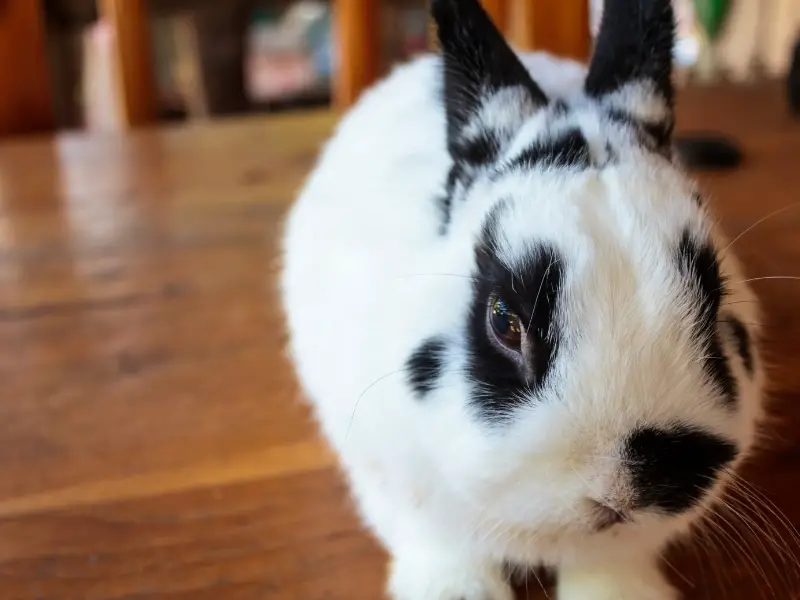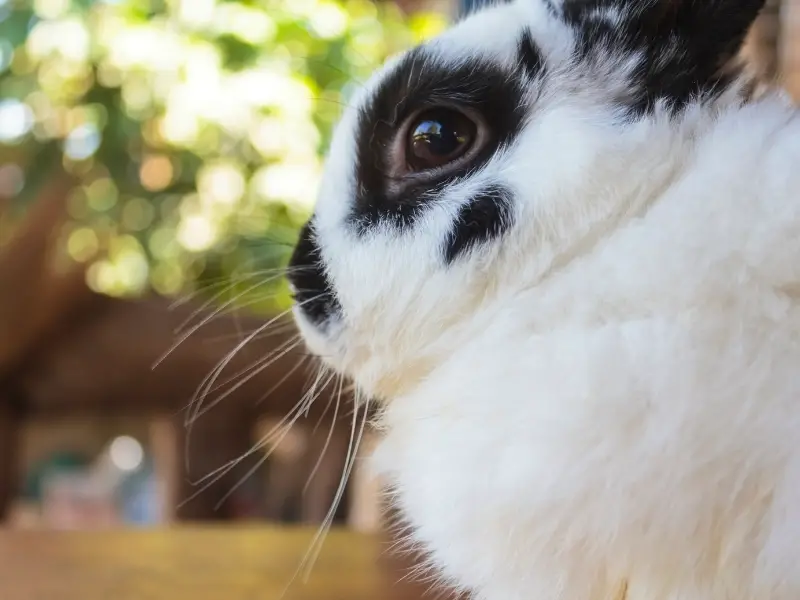One of the smallest rabbit breeds, the Netherland Dwarf rabbit is popular as a show rabbit and a pet. Although small in size the Netherland Dwarf bunny is extremely energetic and always in the mood for playing and some exercise.
So, are Netherland Dwarf rabbits friendly? The Netherland Dwarf rabbit makes a gentle and friendly pet, but it is still more energetic than larger rabbits. Naturally more skittish they are easily frightened by loud noises and rough handling. Thus, the Netherland Dwarf breed isn’t suited for young kids but makes a great pet for adults.
If you are looking for a cute, fluffy, sassy, and small pet rabbit, the Netherland Dwarf rabbit can be a perfect choice. Continue reading to find out everything there is to know about this cute bunny!
What Is a Netherland Dwarf Rabbit?
The Netherland Dwarf rabbit is the smallest rabbit breed and one of just several dwarf breeds. This breed is easily recognizable due to its diminutive size and a disproportionately large head and eyes with respect to the stout body.
Netherland Dwarf Rabbit History and Origin
The Netherland Dwarf rabbit was developed in the Netherlands in the early 20th century by breeding small Polish rabbits with wild rabbits. The result was a small breed of domestic rabbit that comes in a variety of different colors and patterns.
These early Netherland Dwarfs had skittish, fearful, and sometimes aggressive temperaments. This was the result of using wild rabbits for their smaller size. The early dwarfs behaved more like wild rabbits rather than domestic animals and weren’t good pets.
However, years of selective breeding created the modern Netherland dwarf – a gentle and friendly pet rabbit that is still more energetic than larger rabbit breeds.
In 1948 Netherland Dwarfs were first imported into the United Kingdom. The United States imported the first dwarfs in the 1960s and 1970s. This breed was officially recognized by the American Rabbit Breeders Association in 1969 using a modification of a British standard.
Netherland Dwarf Rabbit Characteristics

Although Netherland Dwarfs are often confused with Polish rabbits, they are nothing alike. The Netherland Dwarf’s head and eyes are disproportionately large in relation to its short and cobby body.
Dwarfs have a rounded head and a brachycephalic face, and their ears are notably shorter and carried high on the head (source). These juvenile physical traits are the result of dwarfism and cause a Netherland Dwarf rabbit to retain its juvenile appearance well into adulthood.
Size, Weight, Shape
The Netherland Dwarf breed is known for its small size and typically weighs between 2 and 2.5 pounds. They have a compact body shape and their bodies are often described as short, stubby, or cobby.
Colors
Netherland Dwarf rabbits have a thick short coat and have been bred in a variety of colors. At this time the Netherland Dwarf breed is recognized in 25 different color varieties.
They are ruby eyed white, blue-eyed white, black, blue, chocolate, lilac, red, Siamese sable, Siamese smoke, seal point, blue point, chocolate point, tortoiseshell, agouti, red agouti, opal, cinnamon, lynx, chinchilla, squirrel, tan, sable marten, silver marten.
There are also, black otter, blue otter, chocolate otter, lilac otter, fox, orange, fawn, hotot, Himalayan, harlequin, magpie, broken, butterfly, and mantle.
Lifespan
The expected lifespan of a Netherland Dwarf rabbit is between 7 and 10 years. Before you bring a pet dwarf home make sure that you’ll be able to care for it for many years to come.
Temperament
Small, cute, and fluffy, the Netherland Dwarf rabbit may look like a toy, but it most certainly isn’t. While all rabbits are individuals and their personalities may vary, the Netherland Dwarf as a breed isn’t a suitable pet rabbit for children.
Wild rabbit genes are largely present in this breed making Netherland Dwarfs skittish and aloof. They generally don’t like to be picked up or held and tend to bite or scratch when nervous or frightened.
Not only does this type of behavior can injure a child it can also cause serious injuries to the rabbit. Like all other dwarf breeds, Netherland dwarfs have fragile bones and can easily develop serious injuries if they struggle while being held or fall.
With that being said, Netherland Dwarfs make amazing pets for adults and thrive in quiet and peaceful homes. Extremely active and energetic these small bunnies are bouncing balls of energy that require the same amount of exercise as other breeds of rabbits.
Netherland Dwarf rabbits have much higher intelligence than other rabbit breeds making them much easier to litter train than other rabbits. Since they have the tendency to choose the same spot to relieve themselves, litter training will be a breeze.
Netherland Dwarf Rabbit Care

Due to their mini size, you may think that Netherland Dwarfs don’t need a lot of space and that a small cage will do. But that’s not the case!
Like any other rabbit, the Netherland Dwarf needs the same amount of space relative to its size. This means enough room to make three consecutive hops in either direction, plenty of room to stretch fully and to stand on its hind legs without touching the top of the cage.
When it comes to caring you should pay attention to:
Coat
The Netherland Dwarf rabbit has a thick, short coat that requires minimal grooming. While they are more than capable of keeping their coat clean, you can brush your pet rabbit once a week.
Besides removing loose hair and dander, grooming your pet bunny regularly will strengthen your bond and make your rabbit more relaxed around you.
Claws
Regular nail trimming is an important aspect of caring for your pet rabbit. Since your rabbit’s nails will grow continuously, you’ll need to trim them once a month or as necessary.
Most rabbits don’t like to have their nails trimmed, and if that is the case with your Netherland Dwarf consider taking them to a vet or professional groomer.
Teeth
The Netherland Dwarf breed is brachycephalic which means that they have flattened or squished in faces like bulldogs, boxers, and pugs. This makes them prone to malocclusion which results in overgrown teeth.
To prevent ingrown teeth, cuts, abscesses, and infections in the mouth you’ll have to inspect your rabbit’s teeth regularly.
Feeding a diet that consists mostly of hay and a small number of rabbit pellets will help file your rabbit’s teeth naturally and prevent painful dental problems.
Health
Netherland Dwarf rabbits are generally healthy, and the biggest issues seen in this breed are related to breeding.
Malocclusion and respiratory disease are two common problems seen in Netherland Dwarfs and are the result of the dwarf gene that gives them smaller mouths and shorter noses. Since their lower jaw sticks out farther than the upper jaw their teeth can easily become overgrown and create serious health problems.
Since Netherland rabbits are more prone to dental problems they are much more susceptible to gastrointestinal disorders than other rabbits. This breed may easily lose appetite due to ingrown teeth and not eat enough fiber to keep their guts moving (source).
If your bunny shows symptoms of hunched posture, reduced bowel movement, lethargy, and diarrhea, take them to the vet that will use motility drugs to get your rabbit’s gut moving.
Due to their tiny size, Netherland Dwarfs tend to have extremely fragile bones that easily break, so gentle handling is a must with this breed.
Another thing worth noting is that false dwarfs have fewer health problems than true dwarfs. Also when you breed two true dwarfs, the genetic pattern that makes them true dwarfs ensures that 25% of their offspring will inherit a lethal gene combination.
These baby rabbits are called peanuts and end up dying within the first three weeks due to an underdeveloped digestive system. Ethical breeders euthanize peanuts soon after birth and avoid breeding two true dwarfs in the first place.
Netherland Dwarf Rabbit Price
Pet quality Netherland Dwarf rabbits on average cost around $50. However, you may end up spending more depending on the breeder, location, coat color, and temperament of the rabbit.
If you are planning to show or breed a Netherland Dwarf expect to pay anywhere between $100 and $400 for a show-quality rabbit. Again, you may end up spending more depending on the breeder, pedigree, gender, coat color, and location.
Conclusion
The smallest of domesticated rabbit breeds, the Netherland Dwarf rabbit is a cute and fluffy bouncing ball of energy. Dynamic and sassy, these mini bunnies tend to be skittish and aren’t good pets for children or bustling and loud households.
However, they make extraordinary pets for adults and quiet homes. Once they bond with their owners, Netherland Dwarf rabbits make affectionate companions and thrive in a stable environment with a lot of human interaction.
Related Articles:

